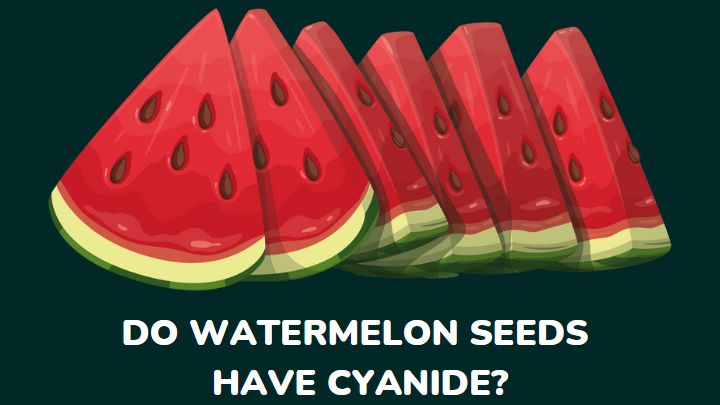Do watermelon seeds contain cyanide? Yes, but only in small quantities. Watermelon seeds contain very little cyanide when compared to some other fruit seeds.
Some foods and plants, such as cassava, lima beans, and almonds, naturally produce cyanide.
Also, apricot, apple, and peach pits and seeds may contain sizable concentrations of chemicals that can be converted to cyanide.
Drinking cyanide-contaminated water, eating cyanide-contaminated food, or touching cyanide-contaminated soil could expose you to the poison.
Keep reading this article to know more about cyanide and whether watermelon seeds contain it.
What is cyanide?
Cyanide is a chemical that has a quick onset of action with the potential to be fatal.
It can exist as sodium cyanide or potassium cyanide crystals or as an inert gas such as hydrogen cyanide or cyanogen chloride.
Additionally, it is sometimes said to have a “bitter almond” smell, but this is not always the case. Plus, not everyone can smell it.
Both natural forces and industrial activities cause cyanide to enter the water, soil, or air. When in the atmosphere, it typically manifests as gaseous hydrogen cyanide.
Also, smoking cigarettes is one of the primary ways people who do not work in cyanide-related fields become exposed to cyanide.
Do watermelon seeds contain cyanide?
Yes, watermelon contains trace amounts of cyanide.
However, there isn’t much cyanide in watermelon seeds; consequently, it would take eating a lot of them to affect the body.
Some of the symptoms of cyanide poisoning include nausea, vomiting, or diarrhea. If you think you or anyone you know may have eaten too many watermelon seeds, get medical help immediately.
Can you eat watermelon seeds?
Yes, you can.
Eating watermelon seeds is safe, so you shouldn’t be concerned. It’s completely fine if some seeds end up in your mouth along with the juicy, sweet watermelon flesh.
How many watermelon seeds can you eat?
The NIH advises adults to consume 18 mg per day.
A handful of watermelon seeds contains 0.29 mg of iron or 1.6 percent of the recommended daily intake.
What types of watermelon seeds are there?
Watermelons have black and white seeds.
White seeds are immature; they cannot be used to start a watermelon plant. Black seeds are found in regular watermelons and can be planted in the soil to regrow a watermelon plant.
What color of watermelon seeds can you eat?
The fruit known as the “watermelon” is distinguished by its red flesh and black seeds. However, there are watermelon seeds in a variety of colors, which include white, yellow, and orange, that can be consumed.
The most popular variety of watermelon seeds consumed is the white variety. They have a mild taste and are frequently used as a garnish on desserts or salads.
The yellow and orange watermelon seed’s flavor is stronger than the white variety, and they are best consumed raw.
Are watermelon seeds poisonous to humans?
No, they are not poisonous.
It’s not a big deal if you happen to eat a few seeds while eating a piece of watermelon because watermelon seeds are safe to consume. As a result, they are neither toxic nor poisonous to humans when eaten in moderation.
FAQs
What other fruit seeds contain cyanide?
Cyanide substance can be found in apple seeds, almonds, cassava seeds, and apricot seeds. Anxiety and headaches are some of the mild cyanide poisoning symptoms.
Do white watermelon seeds turn black?
Yes, it turns black eventually.
Every watermelon seed begins as a tiny, white seed and develops into a larger seed that can be black, red, tan, or spotted.
Can you chew watermelon seeds?
Yes, you can if you want to.
The digestive system can benefit from watermelon seeds. The seeds contain dietary fiber that can help maintain a healthy digestive tract. Furthermore, the antioxidants in the seeds can help prevent cancer and other diseases.
Who should not eat a watermelon that has a black seed?
Pregnant women shouldn’t consume black seed because there is insufficient data on how it may affect the unborn child.
In addition, black seed has blood-thinning qualities. As a result, it should be avoided by people who have bleeding disorders or are taking blood thinners.
Conclusion
Many people enjoy the cooling watermelon fruit in the summer. It is one of the many fruits that help prevent dehydration because it has a lot of juice.
Similarly, watermelon seeds can be eaten, but it is best to spit them out after you’ve consumed the juice from them.
Additionally, do remember that watermelon seeds contain trace amounts of cyanide, a poisonous substance.
Therefore, consuming too many watermelon seeds often will expose you to considerable amounts of cyanide, which may cause serious health issues or even death in rare cases.
Thanks for reading.
If you enjoyed reading this article, visit Millenora for more related articles.

